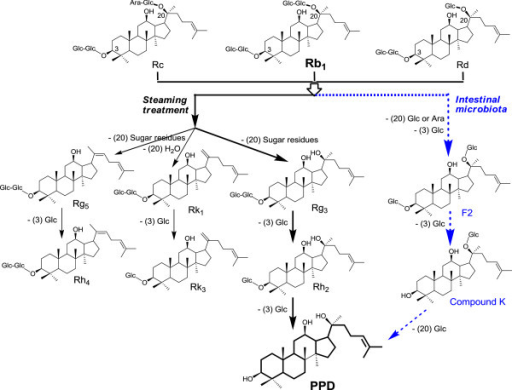A lot has been discussed about berberine's AMPK activation effects and antibiotic effects, but it (as the purified chemical) is first used as an oral antibacterial for GI infections, and even up to this day some researcher still do berberine research on its antibacterial effects:
Role of berberine in anti-bacterial as a high-affinity LPS antagonist binding to TLR4/MD-2 receptor
Ming Chu, Ran Ding, Zheng-yun Chu, Ming-bo Zhang, Xiao-yan Liu, Shao-hua Xie, Yan-jun Zhai, and Yue-dan Wang
Background
Berberine is an isoquinoline alkaloid mainly extracted from Rhizoma Coptidis and has been shown to possess a potent inhibitory activity against bacterial. However, the role of berberine in anti-bacterial action has not been extensively studied.
Methods
The animal model was established to investigate the effects of berberine on bacterial and LPS infection. Docking analysis, Molecular dynamics simulations and Real-time RT-PCR analysis was adopted to investigate the molecular mechanism.
Results
Treatment with 40 mg/kg berberine significantly increased the survival rate of mice challenged with Salmonella typhimurium (LT2), but berberine show no effects in bacteriostasis. Further study indicated that treatment with 0.20 g/kg berberine markedly increased the survival rate of mice challenged with 2 EU/ml bacterial endotoxin (LPS) and postpone the death time of the dead mice. Moreover, pretreatment with 0.05 g/kg berberine significantly lower the increasing temperature of rabbits challenged with LPS. The studies of molecular mechanism demonstrated that Berberine was able to bind to the TLR4/MD-2 receptor, and presented higher affinity in comparison with LPS. Furthermore, berberine could significantly suppressed the increasing expression of NF-κB, IL-6, TNFα, and IFNβ in the RAW264.7 challenged with LPS.
Conclusion
Berberine can act as a LPS antagonist and block the LPS/TLR4 signaling from the sourse, resulting in the anti-bacterial action.
Which makes me wonder whether berberine will modify gut flora, and more than one papers on PubMed say yes:
Modulation of gut microbiota by berberine and metformin during the treatment of high-fat diet-induced obesity in rats.
Zhang X, Zhao Y, Xu J, Xue Z, Zhang M, Pang X, Zhang X, Zhao L.
Accumulating evidence suggests that the gut microbiota is an important factor in mediating the development of obesity-related metabolic disorders, including type 2 diabetes. Metformin and berberine, two clinically effective drugs for treating diabetes, have recently been shown to exert their actions through modulating the gut microbiota. In this study, we demonstrated that metformin and berberine similarly shifted the overall structure of the gut microbiota in rats. Both drugs showed reverting effects on the high-fat diet-induced structural changes of gut microbiota. The diversity of gut microbiota was significantly reduced by both berberine- and metformin-treatments. Nearest shrunken centroids analysis identified 134 operational taxonomic units (OTUs) responding to the treatments, which showed close associations with the changes of obese phenotypes. Sixty out of the 134 OTUs were decreased by both drugs, while those belonging to putative short-chain fatty acids (SCFA)-producing bacteria, including Allobaculum, Bacteriodes, Blautia, Butyricoccus, and Phascolarctobacterium, were markedly increased by both berberine and, to a lesser extent, metformin. Taken together, our findings suggest that berberine and metformin showed similarity in modulating the gut microbiota, including the enrichment of SCFA-producing bacteria and reduction of microbial diversity, which may contribute to their beneficial effects to the host.
Modulation of Gut Microbiota by Berberine Improves Steatohepatitis in High-Fat Diet-Fed BALB/C Mice.
Cao Y, Pan Q, Cai W, Shen F, Chen GY, Xu LM, Fan JG.
BACKGROUND: Dysbiosis of the gut microbiota underlies non-alcoholic steatohepatitis (NASH). Ingredient of Chinese herbal medicine, berberine, has been proved to regulate the gut microbiota without systemic side effects. Therefore, we explored its effects on NASH induced by high-fat diet (HFD).
METHODS: BALB/c mice were randomized into three groups, including: control, model, and berberine treatment. With the exception of the control group with the standard diet, the model, and the treatment groups were treated by HFD. Mice from treatment group were further subjected to berberine (200 mg/kg/d) gavage since the 5th week. At the end of the 13th week, gut bacteria, liver endotoxin receptor, and inflammation cytokines were assessed by real-time PCR. NASH and its predisposing factors were evaluated biochemically and pathologically.
RESULTS: Compared to their decreases in the model group, berberine administration restored the relative level of Bifidobacteria (2.16 ± 0.63 vs. 0.50 ± 0.08, P < 0.01) and the ratio of Bacteroidetes/ Firmicutes (0.76 ± 0.26 vs. 0.39 ± 0.11, P < 0.01), respectively, in the treatment groups. Microbiota restoration led to significant reductions in body weight, serum levels of lipids, glucose, insulin, and homeostasis model assessment of insulin resistance. Improvements were also observed in the serum transaminase activity and nonalcoholic fatty liver disease activity score, which demonstrated the attenuation of NASH. Mechanically, expression levels of CD14, IL-1, IL-6 and TNF-α were statistically down-regulated (treatment group vs model group, P < 0.01).
CONCLUSIONS: Berberine alleviates NASH and its predisposing factors. Normalization of gut microbiota might underlie its effect.
While both papers sees the change in microbiota composition following berberine administration as positive, I'm not completely sure if I should necessarily believe in their opinion at this stage. Still, I sort-of think berberine is probably a relative safe thing to take, unlike Jiaogulan (gynostemma), which has known insulin-releasing effects...
I wonder whether spacing out berberine and a probiotic should resolve any conflict caused?






















































